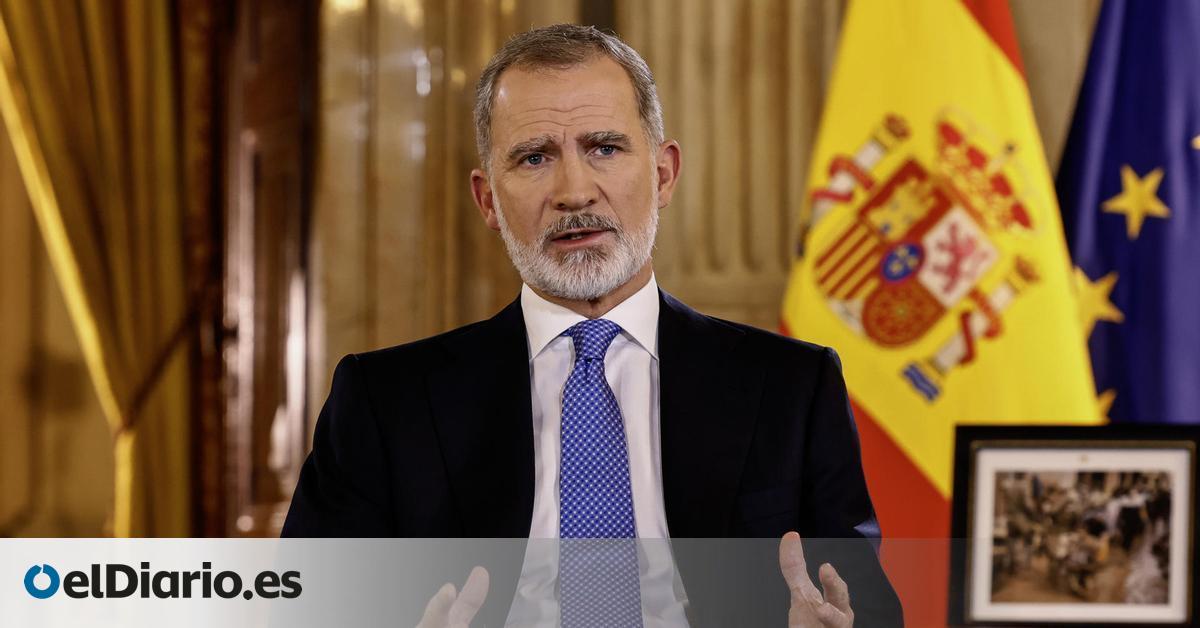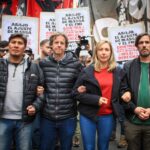
In his traditional Christmas message, King Felipe VI has called for “serenity” in public debate to reduce “the background noise that prevents citizens from hearing.” The head of state has considered the “political conflict” “legitimate”, but has warned that “sometimes” it is “thunderous”, which can prevent “hearing an even more clamorous demand: a demand for serenity”. The king, who is celebrating 10 years on the throne without a single mention of the anniversary, has also demanded “greater and more effective coordination” after DANA, while pointing out the risk that poor management of the reconstruction will cause the Spaniards the “notion of the common good.”
Felipe VI dedicated a good part of his speech this Tuesday precisely to those affected by the flood that flooded a good part of the province of Valencia on October 29 and caused at least 223 deaths. “A fact that is difficult to accept,” in the words of the head of state, “but from which we should all be able to draw the necessary lessons that strengthen us as a society and make us grow.”
The king has chosen the tragedy of Valencia as his particular 23F. If the attempted coup d’état of 1981 allowed Juan Carlos de Borbón to legitimize himself as a democratic king after having inherited the position directly from the dictator Francisco Franco, the strategists of the Royal House have seen an opportunity in the political disaffection that the DANA has caused and the subsequent dispute over political responsibilities for the management of October 29 itself.
Felipe VI has traveled to Valencia three times in less than two months. First, to Paiporta, accompanied by his wife and the President of the Government, Pedro Sánchez, who was attacked and had to leave the delegation. Then he attended the private mass organized by the Archdiocese of Valencia. And this past weekend he repeated it, this time also with his two daughters, on a trip that the Palacio de la Zarzuela called “private” as a justification for not having notified the Government or the local authorities.
The head of state relies on these visits, and on the conversations held with the inhabitants of the most affected areas, to make a demand from politicians. “We have seen – and understood – the frustration, the pain, the impatience, the demands for greater and more effective coordination of the administrations.” Some “emotions,” he continues, that “arise from the same root: the awareness of the common good, the expression of the common good, or the demand for the common good.”
But Felipe VI sees this defense of the “common good” at risk precisely because of what he considers poor management of the tragedy. “It is the responsibility of all institutions, of all Public Administrations, that this notion of the common good continues to be clearly reflected in any speech or any political decision.” The king points out in the reconstruction an opportunity to reverse the supposed loss of common consciousness that the flood could have caused. “May the aid reach all those who need it, so that they can rebuild the future for which they have fought so hard,” he noted, concluding: “The sooner we achieve it, the more we will strengthen our sense of community, our feeling of country.” .
Precisely, Felipe VI has chosen as an accompaniment to his speech a photograph, from the first days after the DANA, which shows the work of the volunteers and the Armed Forces to clean the municipalities affected by the floods.

Against tension
Felipe VI links in his speech the tragedy of the DANA and the political disaffection that, he believes, it can generate, with an express request to politicians to lower the tone of the public debate. “It is necessary that the political conflict, legitimate, but sometimes thunderous, does not prevent us from hearing an even more clamorous demand: a demand for serenity,” he stated. “Serenity in the public sphere and in daily life, to face collective or individual and family projects, to prosper, to care for and protect those who need it most,” he added.
The head of State has maintained that we cannot allow “discord to become a constant background noise that prevents us from hearing the authentic pulse of the citizens,” and has appealed to “prevent the diversity” of opinions “from leading to denial.” of the existence of a shared space.”
Felipe VI has vindicated the “prodigious history” of Spain, “despite its dark chapters” and “exemplary in the democratic development of recent decades, even defeating the terrorist harassment that caused so many victims.” The king has made that brief mention of ETA’s terrorism, but the 46 women murdered by men in 2024 have not taken place in the 1,806 words of his speech.
The head of state has changed the usual setting for his Christmas messages and has chosen the Royal Palace. Specifically, the Hall of Columns, where the monarch presented the decorations of the Order of Civil Merit on the occasion of the 10th anniversary of his coronation. It is the second time that Felipe VI’s Christmas message has been delivered from the Royal Palace. The previous one was in 2015, in the Throne Room.
The king has also emphasized that Spain is “a country with a present that, despite how much we still have to do, for example, in terms of poverty and social exclusion, is promising when observing the behavior of our economy – in terms, among others, of growth, employment or exports – and the general level of our social well-being.”
Housing and immigration
The prominence of the DANA and the political tension has removed from the speech other usual references of the king to the problems facing Spain. But Felipe VI wanted to mention two specific ones and place them on the same level: access to housing and immigration management.
The head of state has assured that “immigration is a complex phenomenon with great social sensitivity” that can be dangerous because, despite being “an everyday reality” it also “can lead – without adequate management – to tensions that erode social cohesion.”
The king has appealed to the “effort of integration, which corresponds to everyone”, in addition to “respect – also by everyone – of the laws and basic norms of coexistence and civility”, as well as the “recognition of the dignity that every human being deserves.” “The way in which we are able to address immigration – which also requires good coordination with our European partners, as well as with the countries of origin and transit – will say a lot in the future about our principles and the quality of our democracy” , has settled.
Felipe VI has located the origin of the housing problem in the lack of “supply” of apartments, especially in large cities. “Cities, especially large cities, act as poles of growth and generate a demand that supply cannot satisfy,” he said in his Christmas message. The king has assured that the housing issue is a conflict that especially concerns “young people”, who seek “opportunities” and overcome “obstacles based on merit and effort.”
To address this problem, the king has asked “that all the actors involved reflect, listen to each other, that the different options be examined and that this dialogue leads to solutions that facilitate access to housing in acceptable conditions, especially for the youngest and the most unprotected, since this is the basis for the security, the well-being of so many life projects.”
In Felipe VI’s tenth Christmas speech, the total absence of direct or indirect references to the figure of his father or to the more or less generic honesty, which he has emphasized in other messages, stands out. This same year it was learned that Juan Carlos de Borbón has created a new financial vehicle in his exile in Abu Dhabi to organize the economic legacy that his heirs will receive upon his death. An inheritance that the king and his daughter, the Princess of Asturias, promised to renounce.
Source: www.eldiario.es

